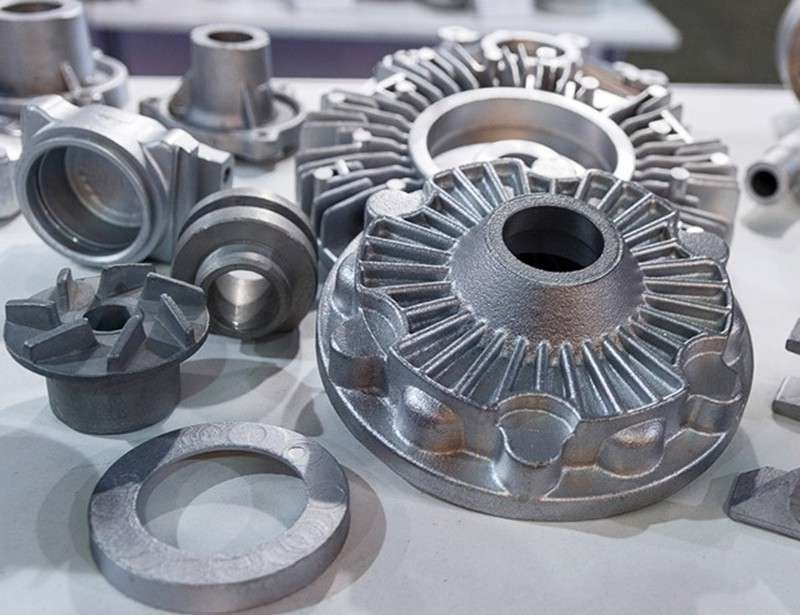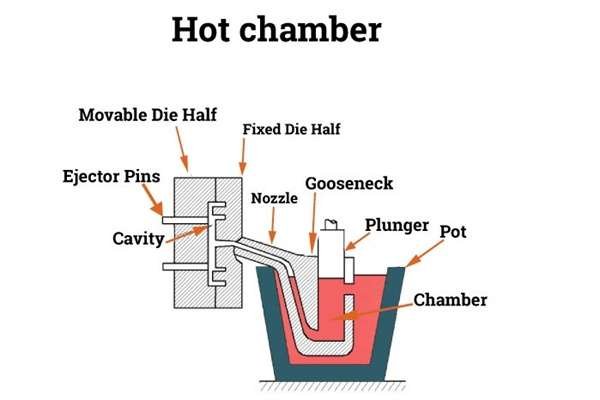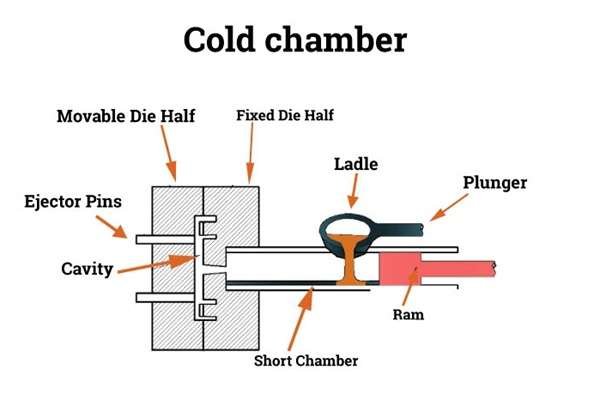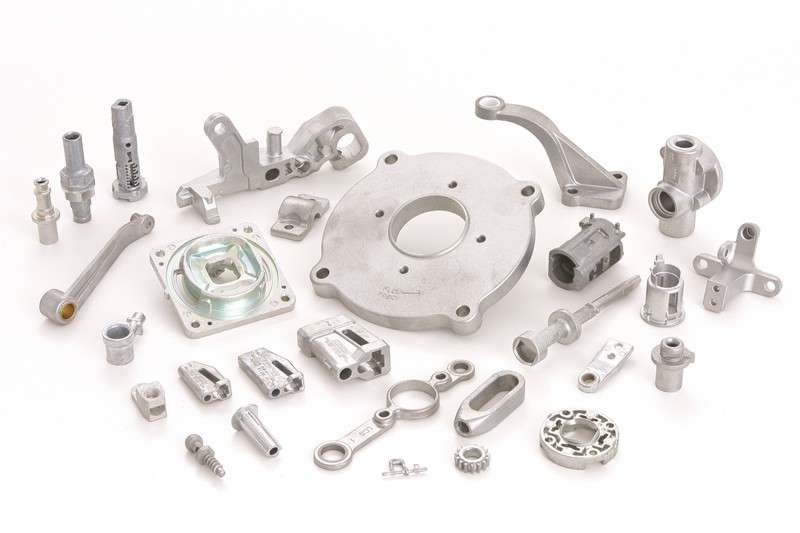Die Casting Services
Custom and specialized die casting services for all types of metal parts as well as customized products. High-Precision die casting parts to meet your needs. Request to get a quote today!
- Ultimate finishing options
- 24/7 Engineering support
- ISO 9001:2015 manufacturer

Our Die Casting Capabilities
XinCheng provides specialized die casting products that exactly match your needs. With years of manufacturing experience, we offer high-quality metal options, including aluminum and zinc die casting.

Hot Chamber Die Casting
Gooseneck casting is another name for hot chamber die casting, and it is a comparatively quick manufacturing process. Molten metal is forced into the die through Pneumatic or Hydraulic-Oriented pistons. The process is most suitable for metals like zinc and copper.

Cold Chamber Die Casting
It is done at room temperature. A separate furnace is used to melt the metal and then transfer it to an unheated shot chamber. Cold chamber die casting is best used with the metals like magnesium or aluminum for casting.
How Does Die Casting Work?
Die casting is a process in which molten metals of specific types are poured into custom dies. Custom die casting parts are made using these custom dies. In general, die casting works through the following procedures.
1. Designing
Initial designing of die casting products is performed through designing procedures like reviewing CAD files to match requirements.
2. Material Verification
Raw materials and tooling procedures are verified to see if they comply with the design requirements of the entire die casting services.
3. Manufacturing Mold
The core and cavity of molds are usually manufactured through CNC machining. It consists of two halves, cover die, and ejector die.
4. Heat Treatment
After the part is ejected, it may undergo heat treatment processes like annealing, quenching, or tempering to improve its mechanical properties and strength.
5. Surface Finishing
The die-cast part undergoes surface finishing processes such as shot blasting, sanding, polishing, or coating to achieve the desired texture, appearance, and corrosion resistance.
6. Assembly and Inspection
All the finished parts are assembled in accordance with the design specifications, and a complete inspection is performed on these custom die casting parts.
Why Choose XinCheng for Die Casting Services?
-
Broad SelectionsYou will get a broad range of selections for your die casting products, including a variety of materials, tight tolerances, and finishing options to suit your requirements. We will also provide custom-based die casting guidelines and suggestions to make the best version of your design.
-
Various Surface TreatmentsNumerous surface treatments are available to alter the surface of metals consisting of anodizing, electroplating, chrome plating, powder coating, and polishing. These surface treatments ensure quality, and functionality for your die casting parts.
-
Strict Quality ControlThrough adherence to ISO 9001:2015, we offer strict quality control procedures. Proper quality inspection tests are conducted on each phase of die casting manufacturing by our experienced engineering team. That’s why the finished die casting parts are always durable and quality-rich.
-
24/7 Technical SupportYou can get 24/7 support from getting quotes to delivery management of die casting products. We also offer an efficient order management system to enable you to track and manage die casting services throughout the manufacturing and delivery process swiftly.
Different Metal Alloys for Making Die Casting Parts
Different metal alloys can be used to manufacture die casting parts as per the requirements. Some of the most common alloys are as follows.

Aluminum Alloys
Aluminum alloy is the most common metal used for die casting purposes. This is due to its remarkable strength-to-weight ratio, easy-to-use and recyclable characteristics, and good mechanical properties. Cold chamber die casting is often used to manufacture aluminum alloys.
- Properties: higher thermal conductivity, low linear shrinkage, corrosion resistance, excellent stiffness
- Aluminum Alloys: A360, A380, A383, A390, A413, ADC-1

Zinc Alloys
Zinc alloys are the most economical and powerful for die casting. It provides great surface finishing options with convenient casting properties. High tolerances and extreme details are some features of zinc alloys.
- Properties: higher impact strength, great hardness, high-quality surface finishing, fluidity, extreme stability
- Zinc Alloys: Zamak-2 (ZA-2), Zamak-3 (ZA-3), Zamak-5 (ZA-5), Zamak-7 (ZA-7), ZA-8, ZA-12, ZA-27

Magnesium Alloys
Magnesium alloys are the best when it comes to preventing thermal cracks in die casting molds. Complex cavities are conveniently filled with magnesium alloys. Some of the primary properties of these alloys are as follows.
- Properties: high strength, considerable fluidity, lower viscosity, high corrosion resistance
- Magnesium Alloys: AZ91D, AM60B, AS41B
Surface Finishes for Die Casting
The final step of die cast manufacturing is post-processing and surface finishing. These processes are applied to counter minor surface defects and enhance die casting product appearance and other mechanical properties.
| Name | Description | Materials | Color | Texture |
|---|---|---|---|---|
| As Cast (Standard) | It is a regular type of surface finishing without the use of any tooling or machining. | All | N/A | N/A |
| Bead Blasting | Fine glass beads are sprayed over the surface of die casting parts using compressed air. In this way, appearance changes with an outstanding look. | Aluminum, Brass, Steel, Stainless Steel | N/A | Matte |
| Powder Coating | Aluminum and Zinc alloys are sprayed with specialized types of dry powder. Then the powder gets automatically absorbed within the surface, equally providing a protect powder layer. | Steel, Stainless Steel, Aluminum | RAL Code, Pantone Number, Black | Semi Glass |
| Anodizing | Anodizing is a process in which a layer of aluminum oxide is applied over die casting goods | Aluminum | Black, Grey, Clear, Gold, Blue, Red | Matte Finish, Smooth |
| Electroplating | It includes options for decorative and functional electroplating, etc. Chrome plating is also an example of electroplating, which is a process of manipulating properties through electrical tooling. | Steel, Stainless Steel, Aluminum | N/A | Glossy, Smooth |
| Brushing | In order to draw traces onto parts, abrasive belts are used. This process is called brushing, and it's usually intended for aesthetic reasons. | Brass, Aluminum, Stainless Steel, Steel | N/A | Satin |
Applications of Die Casting
From the commercial and consumer level up to the aerospace industry, die casting has numerous applications. Some of the prominent applications of it are as under.

- Lighting and Appliances: Electrical housing and appliances like die-cast heat sinks and many others are manufactured through specialized die casts.
- Automotive Components: Production of automotive die-casting parts is our primary strength focusing on cylinders, gears, engine parts, and other related components.
- Consumer and Commercial Products: We also produce numerous consumer die-casting products ranging from compressor pistons up to sink faucet components and meters etc.
Die Casting FAQs
A metal casting procedure in which molten metal alloys are poured into a pre-built mold cavity is called die casting. This process is done under very high pressure as well as speed to make the desired molded products or parts.
Choosing the best metal for die casting services revolves around the analysis of two primary aspects. One is your design requirements, and the other is the feasibility (physical properties, benefits, and disadvantages). As there are many metal options, such as Aluminium, Zinc, Magnesium, Tin, Brass, Lead, and Copper, XinCheng can help you choose the best one after considering primary aspects.
There is quite a low chance of die casting parts getting rusted as die casting products are not generally made from iron. Aluminium, Zinc, and Magnesium are common metals used for their manufacturing. However, if it lacks care and protection for a longer time makes it is prone to rust.

